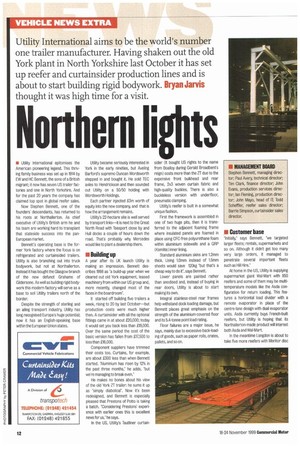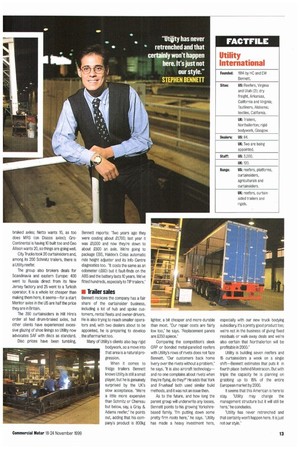Northern lights
Page 14

Page 15

If you've noticed an error in this article please click here to report it so we can fix it.
Utility International aims to be the world's number one trailer manufacturer. Having shaken out the old York plant in North Yorkshire last October it has set up reefer and curtainsider production lines and is about to start building rigid bodywork. Bryan Jarvis thought it was high time for a visit.
II Utility International epitomises the American pioneering legend. This thriving family business was set up in 1914 by FW and HC Bennett, the sons of a British migrant; it now has seven US trailer factories and one in North Yorkshire. And for the past 20 years the company has claimed top spot in global reefer sales.
Now Stephen Bennett, one of the founders descendants, has returned to his roots at Northallerton. As chief executive of Utility's British arm he and his team are working hard to transplant that stateside success into the panEuropean market.
Bennett's operating base is the former York factory where the focus is on refrigerated and curtainsided trailers. Utility is also branching out into truck bodywork, but not at Northallerton. Instead it has bought the Glasgow branch of the now defunct Grahams of Gildersone. As well as building rigid bodywork this modern factory will serve as a base to sell Utility trailers north of the border.
Despite the strength of sterling and an ailing transport industry, Utility has long recognised Europe's huge potential; now it has an English-speaking base within the European Union states.
Utility became seriously interested in York in the early nineties, but Aveling Bar-fords supremo Duncan Wordsworth stepped in and bought it. He sold TEC axles to Hendrickson and then sounded out Utility on a 50/50 holding with Wordsworth Holdings.
Each partner injected £3m worth of equity into the new company, and that is how the arrangement remains.
Utility's 22-hectare site is well served by transport links—it is next to the Great North Road with Teesport close by and Hull docks a couple of hours down the road. That's probably why Mercedes would like to plant a dealership there.
• Building up
A year after its UK launch Utility is making an impression. Bennett describes 1998 as "a build-up year when we cleared out old York equipment, leased machinery from within our US group and, more recently, changed most of the faces in the boardroom".
It started off building five trailers a week, rising to 20 by last October—but production costs were much higher then. A curtainsider with all the optional fittings came in at about £20,000; today it would set you back less than £19,000. Over the same period the cost of the basic version has fallen from £17,500 to less than £16,000.
Component suppliers have trimmed their costs too. Curtains, for example, are about £300 less than when Bennett started. "Aluminium has risen by 12% in the past three months,' he adds, "but we're managing to break even."
He makes no bones about his view of the old York 71trailer: he sums it up as "simply diabolical". Now its been redesigned, and Bennett is especially pleased that Prestons of Porto is taking a batch. "Considering Prestons' experience with earlier ones this is excellent news for us," he says.
In the US, Utility's Tauthner curtain
sider (It bought US rights to the name from Boalloy during Gerald Broadbent's reign) costs more than the Zr due to the expensive front bulkhead and rear frame, 2x3 woven curtain fabric and high-quality buckles. There is also a buckleless version with underfloor, pneumatic clamping.
Utility's reefer is built in a somewhat unique fashion.
First the framework is assembled in one of two huge pits, then it is transferred to the adjacent foaming frame where insulated panels are foamed in place using CFC-free polyurethane foam within aluminium sidewalls and a GRP (Kemlite) inner lining.
Standard aluminium skins are 1.2mm thick. Using 1.0mm instead of 1.5mm sheets would save 120kg "but that's a cheap way to do it", says Bennett.
Lower panels are painted rather than anodised and, instead of buying in rear doors, Utility is about to start making its own.
Integral stainless-steel rear frames help withstand dock loading damage, but Bennett places great emphasis on the strength of the aluminium-covered floor and its 5.4-tonne point load rating.
Floor failures are a major issue, he says, mainly due to excessive back-loading of goods, such as paper rolls, crates, pallets, and so on.
• Customer base
'Initially,' says Bennett, 'we targeted larger fleets; rentals, supermarkets and so on. Although it didn't get too many very large orders, it managed to penetrate several important fleets such as Hill Hire."
At home in the US, Utility is supplying supermarket giant Wal-Mart with 850 reefers and some of them may be multitemperature models like the Asda configuration for return loading. This features a horizontal load divider with a remote evaporator in place of the centre-lane design with dual evaporator units. Asda currently buys French-built reefers, but Utility is hoping that its Northallerton-made product will interest both Asda and Wal-Mart In the meantime Langdon is about to take five more reefers with Mentor disc braked axles; Netto wants 10, as too does MRS (on Discos axles); GroContinental is having 10 built too arid Geo Allison wants 20, so things are going well.
City Trucks took 20 curtainsiders and, among its 200 Schmitz trailers, there is a Utility reefer.
The group also brokers cleats for Scandinavia and eastern Europe: 400 went to Russia direct from its New Jersey factory and 25 went to a Turkish operator. It is a whole lot cheaper than making them here, it seems—for a start Mentor axles in the US are half the price they are in Britain.
The 350 curtainsiders in Hill Hire's order all had drum-braked axles, but other clients have experienced excessive glazing of shoe linings so Utility now advocates SAF with discs as standard.
Disc prices have been tumbling, Bennett reports; "Two years ago they were costing about £1,700; last year it was 21,000 and now they're down to about 1.500 an axle. Were going to package EBS, Haldex's Colas automatic ride height adjuster and its Info Centre diagnostics too. "It costs the same as an odometer um but it fault-finds on the ABS and the battery lasts 10 years. We've fitted hundreds, especially to TIP trailers."
• Trailer sales
Bennett reckons the company has a fair share of the curtainsider business, including a lot of hub and spoke customers, rental fleets and owner-drivers. He is also trying to reach smaller operators and, with two dealers about to be appointed, he is preparing to develop the aftermarket too.
Many of Utility's clients also buy rigid bodywork, so a move into that area is a natural progression.
When it comes to fridge trailers Bennett knows Utility is still a small player, but he is genuinely surprised by the UK's slow acceptance. "We're a little more expensive than Schmitz or Chereau but below, say, a Gray 84, Adams reefer," he points out, adding that his company's product is 800kg
lighter, a bit cheaper and more durable than most. "Our repair costs are fairly low too," he says. "Replacement panels are 5,350 apiece:.
Comparing the competition's sleek GRP or bonded metal-panelled reefers with Utility's rows of rivets does not faze Bennett. "Our customers back home livery over the rivets without a problem," he says. "It is also aircraft technology— and no one complains about rivets when they're flying, do they?" He adds that York and Fruehauf both used similar build methods, and t was not an issue then.
As to the future, and how long the parent group will underwrite any losses, Bennett points to his growing Yorkshirebased family. "I'm putting down some pretty firm roots here,' he says. "Utility has made a heavy investment here, especially with our new truck bodying subsidiary. Its a pretty good product too; we're not in the business of giving fixed residuals or walk-away deals and we're also certain that Northallerton will be profitable in 2000."
Utility is building seven reefers and 15 curtainsiders a week on a single shift—Bennett estimates that puts it in fourth place behind Montracon. But with triple the capacity he is planning on grabbing up to 15% of the entire European market by 2000.
It seems that this American is here to stay. 'Utility may change the management structure but it will still be here, he concludes.
"Utility has never retrenched and that certainly won't happen here. It is just not our style."
FACTIFILE Utility International
Founded: 1914 by HC and EW Bennett.
Sites:
US: Reefers, Virginia and Utah (2); dry freight, Arkansas, California and Virginia;
Tautliners, Alabama; textiles, California.
UK: Trailers, Northallerton; rigid bodywork, Glasgow.
Dealers:
US: 84.
UK; Two are being appointed.
Staff:
US: 3,000.
UK: 120.
Range:
US: reefers, platforms, curtainsiders, agriculturals and curtainsiders.
UK: reefers, curtainsided trailers and rigids.
















































































































